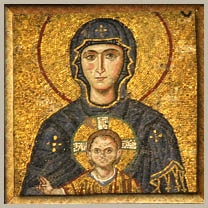These amazing drawings prove that the mosaics of Hagia Sophia were uncovered for almost 300 years after the conquest. Millions of Muslim worshippers prayed under Christ, the Virgin and the Seraphim.

Chapter XXXVII
I See My Husband for the Last Time - Christmas Day 1918
When at our next meeting, I announced to the Grand Duke that his danghters were in Finland, he started with surprise. Alarmed at first, he came to realise that it was common sense itself and that it was necessary to concentrate on just the one thinghis own liberation. My dear niece, Olga Golovine, came to tell me that if I would see a lady whom I knew only by name there might be a chance through her of purchasing the Grand Duke's freedom at the price of a million roubles, payable in Finland. Accompanied by Lieut. Michael Wielandt, whom I introduced as my nephew, I went to call on this lady to discuss this delicate question. She introduced me to another person in close touch with Zinovieff. The latter was to receive the lion's share of this enormous sum.
Meanwhile I was doing everything in my power to have the Grand Duke transferred to the private hospital of Dr. Orshansky in Persochnaia Street, near the Botanical Gardens. I spoke about this to the three doctors at the prison hospital, and I went to see the doctor of the private hospital. The latter said to me:
"I am quite ready to receive and look after the Grand Duke, but promise me that you wiH not arrange for him to make his escape."
In spite of everything, and, above all, in spite of the hunger which was tormenting me worse and worse (we ate only once a day, at four o'clock), I tried to keep intact my energy and clearness of mind, but my health was being tried more and more.
Armand Saint-Sauveur came to us every evening and brought a note of gaiety into our dismal atmosphere. Meanwhile life at Marianne's began to become too expensive for me. I shared their expenses, and my last remaining resources were vanishing perceptibly. I looked about for one or two furnished rooms and found them at the Fontanka, near the Anitchkoff bridge, in the house of a dealer in pianos, who gave me two fine rooms at a high figure.
A charming friend, Helene Vassilievna Ponomareff, was staying in the same house, below me. I arranged to take my meals with her, and she overwhelmed me with cares and attentions and kindnesses. It was in her home that, some months before, I had learnt to know and to love Anatole Fedorovitch Koni, the famous jurist, senator and member of the Council of the Empire, one of the most eminent and enlightened men of our time. His conversation shone with wit and verve and erudition. He loved music and poetry, and it was his great appreciation for the budding genius of my son Vladimir that brought us together. One day, seeing me even more than usually troubled, owing to the lack of news of Vladimir, he said to me: "Be at ease in your mind, Princess, God will watch over him, and not for you only, but for Russia one of whose glories he will be as a poet." Already very old (he must be seventy-six or seventy-eight now), crippled and all bent by age and illness, when he entered the room he seemed to irradiate it! Helene Vassilievna Ponomareff had never married. " Having known Anatole Fedorovitch Koni," she said, "one cannot love, or marry anyone else. He would not marry me, feeling he was too old; well, I have not married and I have no regrets." She also loved my son and appreciated greatly his talent.
Two years after Vladimir's death, among the letters found on his mutilated body and impregnated for ever by the terrible smell of the mine, was one from Koni addressed to my son at Ekaterinburg; here is an exact translation of it:
Petrograd, 7th May, 1918.
DEAR AND WELL-BELOVED VLADIMIR PAVLOVITCH -
I avail myself of this opportunity of writing to you, feeling persuaded that my letter will reach you. I learn through your mother, whose acquaintance I regard not merely as a happiness for me but as a precious moral acquisition, that they are taking you further a\vay from us. But " let not your heart grieve!" Destiny leads you by a path of thorns per aspera ad astra. Remember Heine's words: "The pearl is a malady of the denizen of the shell; poetry is the malady of the mind," You yourself. full of serenity despite your troubles, have given us so many pearls of pure colour and of form a.nd of weight. Destiny sends you new trials like blows from a heavy hammer but your great predecessor has said: "Thus the heavy hammer in breaking the glass forges the steel." Bear these blows with courage, drawing from them experience of life and strength to bear it. Know that many hearts are beating for you with sympathy. Pushkin's situation in Bessarabia, at Ochta and in the district of Porchevo was not better than yours and remember what he created.
God will have pity on our unhappy country and you will come back full of strength and still more loved by us all, if indeed that is possible.
I embrace you,
Yours devotedly,
A. KONI.
P.S. - I write in haste from Helene Vassilievna's.
In my never-ending grief I think with gratitude of the author of this letter, who has remained 'in Russia, My dear child some weeks before his death, will have had a moment of pride and joy. He must have prized this letter much, as he carried it next his heart together with a touching letter from his father, two letters from his little sisters and a letter from me which I cannot re-read without weeping.
Installed at the Fontanka, I continued to take my husband his food, prepared by Mlle. Ponomarefi's admirable cook and supervised by herself. My dear prisoner found it all excellent; unfortunately for me, the distance was still too much for me and I was just tumbling to pieces from weakness. We were now getting near to Christmas. I tried not to think of the beautiful Christmasses of former days. I went on Christmas Eve to the Cathedral of Our Lady of Kazan where, despite this impious Bolshevism, or perhaps because of it, services were stamped with an imposing solemnity. Then I went to call on my poor mother of whom I had been seeing so little, being absorbed by my journeys to the hospital. I remained a short time with her and she said to me suddenly:
I have seen two crosses in a dream. Wha t were the crosses that the Grand Duke wore when in uniform? "
"My dear mamma, he had all kinds of crosses. He has the Grand Cross of France; the Collar of the Annonciade; the Cross of St. George, and two boxes full of decorations. I don't know which you mean."
"I tell you I have seen two crosses, but they were not the ones you name."
This conversation made a painful impression on me without my being able to give any reason for it. On the morrow, Christmas Day, and one of my days for meeting my husband, I arrived at the hospital. I noticed signs of great excitement there and anguished faces. The young Director said to me:
"I have just been relieved of my functions. It seems I was too indulgent and too weak for the prisoners, Three Commissaries from the Deriabinsky prison have been appointed here. You will see how things are..."
"I went past the sentry with my permit and entered my husband's room. He knew already about the change and had seen the three Commissaries. An hour before my arrival a strange scene had taken place: the door of his room opened suddenly and one of the Commissaries, with a big cigar In his mouth, entered and began to stare at the Grand Duke. My husband, who had a wonderful memory, inherited from his father, the Emperor Alexander II, recognised at once in this individual the sailor who had been attached formerly to the Heir to the Throne, an assistant to the sailor Derevenko. Clean~shaven now, dressed in the latest fashion, his hair pomaded, his fingers laden with stolen rings, he felt certain he would not be recognised, while a morbid curiosity impelled him to go and see the captive Grand Duke.
"Good day, Gilenko! " said the Grand Duke. " How are you? "
The bandit started at being recognised and thus addressed. He took the cigar out of his mouth and hid it behind his. back and, still staring at the Grand Duke, backed ont of the room, vanishing without saying a single word!
I had been with my husband for scarcely more than a quarter of an hour when an evil-looking man; big, ill-shaven, \vith squinting eyes andpock-marked skin, came in without knocking, followed by two soldiers.
"Who are you? What are you doing here? " he asked me brutally.
"I am the wife of Paul Alexandrovitch and I have come to see him, having a permit from the Extraordinary Commission."
He took my paper, looked at it, and said to me in brusque tones:
" his permit has no value any longer. ' It is dated December 1st, There is a new order that all permits must be renewed every week. Get away out of this! "
"Comrade, I beg of you, allow me to stay here to~day. I am tired and ill, and it is Christmas Day to-day."
"Christmas! What rubbish! All the festivals have been abolished. The only festivals are November 7th, the day of our coming into power, and May 1st, that of the Proletariat."
Unable to control my misery, I began to weep.
"Well, well, I'll let you remain twenty minutes, on condition that a Red Guard is present at your conversatIon."
He called up a fat-faced soldier, of idiotic aspect, and placed him with his gun beside us, and then went out. As soon as he had gone some distance the idiotic expression left the soldier's face and he said to us with good sense enough:
"My word, they are mad. Why should I listen to what you have to say to each other? Now that he has gone I shall leave you and remain at the door, outside."
Before five minutes had elapsed we heard shouts and vociferations at the door. The ruffian had come back to see if his orders were being respected. Seeing the sentry standing in the corridor, he pushed him brutally into the room:
"Ah, you venture to disobey me! These bourgeois want to have their tete-a-tete, do they? Very well, we'll see,"
"Get out of this, comrade!" he cried to me, "and you'll see whether you'll come so soon again to your darling. . . "
I threw myself into my husband's arms and we embraced each other lingeringly, sadly, for the last time.
The date was December 25th, Christmas Day.





